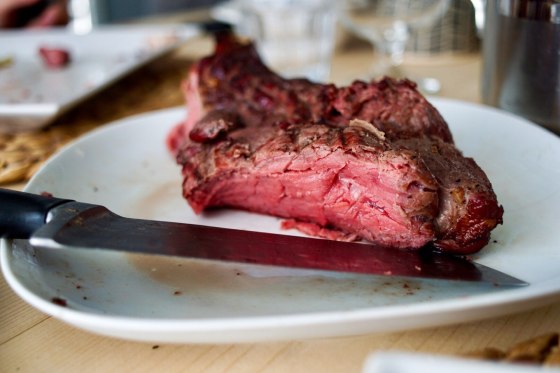Many nutrition experts claim that red meat is unhealthy and including it in your diet might send you to an early grave. Unfortunately, this myth has been kept alive for quite a while and is based on shaky research that is far from conclusive.
Red meat provides a host of nutritional benefits that can’t be obtained from plants. In fact, the warnings against eating red meat are actually contributing to an increase in metabolic diseases, depression, and cognitive decline.
Red Meat Contains Cancer-Fighting Natural Trans Fats
You read that right. Conjugated Linoleic Acid (CLA) is a natural trans fat that fights cancer. Trans vaccenic acid (VA) is another natural trans fat that helps to reduce risk factors associated with heart disease, diabetes, and obesity.
Natural trans fats are a stark contrast to artificial trans fats that are found in hydrogenated oils. Artificial trans fats actually contribute to this list of disorders.
Some nutrition experts are concerned about how trans fat information is shown on labels. As it stands, both natural and artificial trans fats are calculated together, although they are entirely different substances.
Grass-fed meat is always a healthier option. In this case, it contains two to three times as much CLA as conventional beef.
Red Meat Reduces Depression and Anxiety
Beef contains a variety of fats. Less than half of the fat content of red meat is saturated, contrary to what many might think. Since your brain is about two-thirds fat and your nerves are protected by sheaths made mostly of fat, this nutrient is pretty important for your brain to function properly.
Diets that are low in fat and cholesterol have been associated with depression. Several studies have shown that people who have low cholesterol tend to suffer more depression and suicidal thoughts.
A recent study from Australia found that women who consume red meat were more likely to enjoy better mental health. Depression and anxiety were found to be twice as common in those who didn’t include lamb or beef in their diets.
Another study has shown that depression and anxiety can be cut in half with the consumption of red meat.
Grass-Fed Beef Has a Healthy Balance of Polyunsaturated Fatty Acids
Most of the cattle and sheep in Australia are grass-fed. This may be a contributing factor as to why the women in the aforementioned study suffered less depression.
Grasses contain chloroplasts that are converted into omega-3 polyunsaturated fatty acids (PUFAs) by the cows that eat them. Many studies have shown that people with higher amounts of omega-3s in their diets have less risk of depression.
Grass-fed beef provides an ideal ratio of omega-6 to omega-3 PUFAs, which is about 1:1. This means that it contains equal amounts of omega-6 and omega-3. The average ratio of omega-6s to omega-3s in today’s diets, whether vegetarian or omnivorous, is about 15-20:1. This imbalance has been shown to result in inflammation and disease.
Red Meat is an Excellent Source of B Vitamins
Vitamin B complex is vital for a properly functioning nervous system and healthy blood. Vitamin B12 deficiencies are common, interfering with memory, mood, and clear thinking. Red meat is one of the best sources of B12.
Plants contain a compound similar to B12, but it isn’t the real thing. In fact, it has been shown to interfere with the absorption of B12 and mask a deficiency in this vitamin.
Red meat is also a rich source of all the amino acids, zinc, iron, selenium, and phosphorous, and contains lower amounts of various other nutrients like A, E, carnosine, and creatine.
Choose Organic and Grass-Fed
Like other nutritious foods, red meat can lose its health benefits when it is processed and combined with unhealthy foods. A fast-food burger made of poor quality meat and combined with fillers is not going to offer the health benefits of pure, grass-fed beef. Neither is conventional factory-farmed meat that is fed grains.
Most studies claiming that red meat is bad for you were observational and conducted on traditional factory-farmed meat that was processed, not organic grass-fed. The composition of the two is completely different. When your red meat is organic, grass-fed, and free of hormones, antibiotics, pesticides, as nature intended it to be, then it does not cause disease.
Red meat, especially grass-fed beef, is one of the most nutritious foods you can eat. It is packed with beneficial nutrients, some of which cannot be obtained from other sources, and all of which support a healthy heart and brain. For mental sharpness, improved mood, and overall good health, enjoy it frequently as part of your balanced Paleo diet.
Resources:
University of Alberta. “Natural Trans Fats Have Health Benefits, New Study Shows.” ScienceDaily, 2 Apr. 2008. Web. 26 Mar. 2012.
Marano, Hara E. “The Risks of Low-Fat Diets.” Psychology Today, 29 Apr. 2003. Web. 25 Mar. 2012.
Partonen, T., J. Haukka, J. Virtamo, P. R. Taylor, and J. Lonnqvist. “Association of Low Serum Total Cholesterol with Major Depression and Suicide.” The British Journal of Psychiatry 175.3 (1999): 259-62. Print.
“Red Meat Halves Risk of Depression.” The Telegraph UK, 21 Mar. 2012. Web. 26 Mar. 2012.
Karabudak, E., G. Kiziltan, and N. Cigerim. “A Comparison of Some of the Cardiovascular Risk Factors in Vegetarian and Omnivorous Turkish Females.” Journal of Human Nutrition and Dietetics (2007): 071115142837001. Print.
Jacka FN, et al. “Red meat consumption and mood and anxiety disorders.” Psychother Psychosom. 2012;81:196–198.
Photo by Sven Brandsma on Unsplash



I have read most of the vegan peoples views and i have read a lot of the paleo peoples views. The trouble is, That both sides are very convincing. I think it is logical to have meat in our diet. So i decided to eat meat, but in small amounts, once or twice a week. Chick, Beef, and Fish, Slow cooked and at low temps, not overdone. And always grassfed, organic, Which helps me keep consumption low.
I read your articles often and i save the ones that seem particularly brilliant and pertinent to my way of thinking. I am commenting also, because i never seem to see comments to your articles. I think you deserve kudos for your excellent advice.
DeWayne
Hi DeWayne,
Sorry for the delay in response. This comment got lost in the spam shuffle. Yeah, I don’t have a very talkative crowd, but that’s okay. Thanks for your kudos, I appreciate it. Well, meat should really be part of the diet in all three meals, every day. If you need more convincing on that, you may want to take a look at the following page.
https://www.holistichelp.net/blog/being-vegetarian-is-not-healthy/
Best
Cynthia